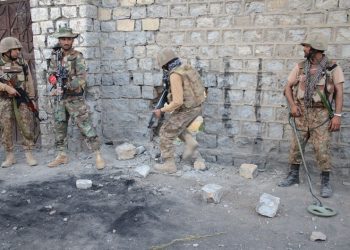Pakistan’s Foreign Office (FO) has slammed India for its alleged involvement in the murder of Sikh leader Hardeep Singh Nijjar saying that the incident reflects India’s global “extrajudicial” network of state-sponsored targeted killings.
Addressing the media during the weekly press briefing in Islamabad on Wednesday, FO spokesperson Mumtaz Zahra Baloch said that the news of Indian involvement in an extrajudicial killing in Canada reflects that New Delhi’s “network of extra-territorial killings had now gone global”.
Responding to a question pertaining to Canadian Prime Minister Justin Trudeau’s statement of “credible evidence” linking India to Nijjar’s murder, the FO spokesperson said: “India’s assassination of a Canadian national on Canadian soil is a clear violation of international law and the UN principle of state sovereignty.”
Terming the incident as a “reckless and irresponsible act”, Baloch questioned India’s reliability as a credible international partner and its claims for enhanced global responsibilities.
She also recalled India’s previous record in such extra-territorial activities accentuating that the Indian premier intelligence agency, the Research and Analysis Wing (RAW), had been actively involved in abductions and assassinations in South Asia.
The development comes as Pro-Khalistan Sikh leader Hardeep Singh Nijjar, a strong supporter of an independent Sikh homeland known as Khalistan and local leader of Sikhs For Justice and Khalistan Referendum campaign, was gunned down on June 18 outside a Sikh cultural centre in Canada’s British Columbia.
Baloch also reminded that in December 2022, Pakistan released a comprehensive dossier providing concrete and irrefutable evidence of India’s involvement in the Lahore attack of June 2021. The attack was planned and executed by Indian intelligence.
Separately the FO also mentioned Kulbhushan Jadhav’s — a high-ranking Indian military officer commander — confession acknowledging his involvement in directing, financing, and executing terror and sabotage in Pakistan.
‘Credible allegations’ linking India with Sikh leader murder: Canadian PM
Earlier this week, Canadian Prime Minister Justin Trudeau while speaking in the House of Commons, had said that Canada’s national security agencies are investigating “credible allegations” that the “agents of the government of India” were involved in the killing of Hardeep Singh Nijjar.
Canada has also named the diplomat who has been expelled for plotting to kill the Sikh leader as Pavan Kumar Rai, the head of India’s intelligence agency RAW in Canada, operating from the Indian High Commission.
The two countries have since engaged in a tit-for-tat diplomatic row with Canada expelling the Indian intelligence operative Rai. In response, India too summoned the Canadian High Commissioner in New Delhi informing him to leave the country on Tuesday.
“The concerned diplomat has been asked to leave India within the next five days,” India’s Ministry of External Affairs said.
FO rebukes Indian allegations over IIOJK encounter
Addressing Indian allegations linking Pakistan with the Anantnag encounter over in Indian Illegally Occupied Jammu and Kashmir (IIOJK), Baloch said that India has a “habit of implicating Pakistan in anything that happens under its watch”, especially in the illegally occupied territory.
Responding to a question pertaining to Pakistan’s engagement with India at levels of the foreign ministries and Director General Military Operations (DGMOs), the FO spokesperson apprised that the main channel of communication between Pakistan and India, i.e., at the level of diplomatic missions had reduced its strength to charge d’affaires.
“If functional, the DGMO level also existed between the two countries,” she added.
Expressing Pakistan’s willingness to hold talks with India, the spokesperson said that Pakistan is ready to hold talks with India on all disputes, especially the core disputed Himalayan territory.
“With regard to third-party mediation, Pakistan has always said that we would welcome it on the IIOJK issue on the basis of the UN Security Council resolutions and in accordance with the principles of international law,” she said.















































